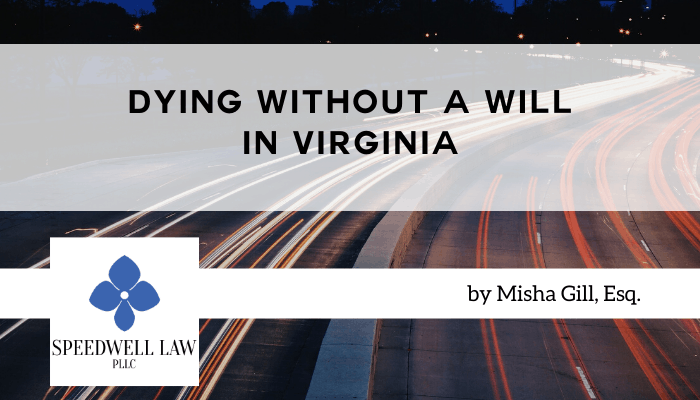
Dying Without a Will in Virginia
When someone dies without leaving a valid Will, they are said to have died intestate. With no Will to refer to, probating an intestate estate and deciding who will inherit what from that estate is governed by Virginia’s intestate succession statutes. This can mean that the things you wanted to leave to certain people will not necessarily go to them.
Each state has its own intestate statutes to deal with this kind of situation because, unfortunately, it happens a lot. Under Virginia interstate statutes, your estate will be distributed in the following manner:
1. If You Die Without a Will and Were Single:
If you die without a Will and are single with children, your entire estate will be distributed in equal shares to your children. If any of your children have already passed away, that person’s share will be distributed to their children (your grandchildren).
If you die without a Will and are single with no children, your estate will be divided, in equal shares, to your parents. If you are survived by only one parent, that parent will inherit your entire estate. If both your parents have already passed away, your estate will be distributed in equal shares to the following surviving relatives, in order of priority:
- Siblings
- Grandparents
- Aunts and uncles
- Cousins
- The children, parents, or siblings of your predeceased spouse
2. If You Die Without a Will and Were Married:
If you die without a Will and were married at the time of your death, how your assets will be distributed will depend on:
- How ownership of your assets was allocated at the time of your death, as it pertains to marital property, community property, and separate property;
- Whether or not you are survived by any children and if those children are from your surviving spouse or someone else; and
- How long you were married to your surviving spouse
Generally speaking, if you die without a Will and are married with children from your surviving spouse, he or she will inherit your entire estate. Otherwise, your surviving spouse will inherit up to one-half of your “augmented” estate, with the remainder being divided amongst your children from the other spouse or partner.
Finally, if you die leaving no valid Will and no one who is entitled to inherit from your estate, the entire estate will escheat to the Commonwealth of Virginia.
Sometimes There is Nothing to Inherit
In some cases, even if you leave behind a very sizable estate, those who are legally entitled to inherit from your estate may ultimately receive nothing. One common situation in which this might happen is when you left only non-probate property behind.
Non-probate property bypasses the probate process and is distributed, by law, to whomever you named as a beneficiary of the asset. Common examples of non-probate property include life insurance, retirement accounts, IRAs, 401Ks, bank accounts, property held in joint tenancy, and property held in trust.
Another common example of where those who are legally entitled to inherit from your estate may receive nothing is when you have left behind debts in excess of the value of your estate. When this is the case, your estate is said to be insolvent, and, in some cases, this can even mean that your heirs will be left with only your bills to pay.
Conclusion
If you die without a valid Will in place, you will leave the distribution of your estate up to the state, and your loved ones with a great deal of uncertainty about what your true wishes are. What’s more, there can be additional costs and time delays when probating an estate when there is no Will.
If you need help preparing your Will or if you believe that you are entitled to inherit from a deceased loved one’s estate, don’t delay. Make an appointment with a qualified and experienced Virginia probate and estate planning attorney for the help you need.
Contact Speedwell Law at (703) 553-2577 or use the contact form on our website.
The information on this site is for general informational purposes only. The information presented in this site is not legal advice or a legal opinion. You should seek the advice of legal counsel of your choice before acting upon any of the information in this site.





